Mission in Korea: Then and Now
.
.
By David Brand.
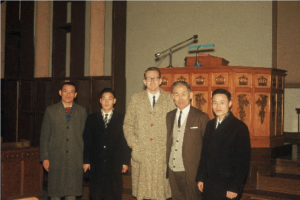 The day we arrived in Seoul the smell of tear gas lingered in the streets. In the school year of 1965-66 my wife Marilyn and I participated in the Volunteer Service program of the United Presbyterian Mission in Seoul, Korea in fulfillment of Fuller Seminary’s Middler-Year-in-Missions. Pictured here, I had just finished preaching a sermon on a Sunday evening at Seoul’s Saimoonan Presbyterian Church reputed to be the oldest Protestant church in Korea. The pastor, second from the right, had graciously interpreted my message. Pak Yung Shin (far left), nephew of the President of Yonsei University, expressed that he would like for me to speak at a church to the south of Seoul where his father served as pastor. I assured him I would be delighted to do so. This would be time out from my regular duties at Seoul Foreign School, the dormitory for MK’s, and Tagwang High School.
The day we arrived in Seoul the smell of tear gas lingered in the streets. In the school year of 1965-66 my wife Marilyn and I participated in the Volunteer Service program of the United Presbyterian Mission in Seoul, Korea in fulfillment of Fuller Seminary’s Middler-Year-in-Missions. Pictured here, I had just finished preaching a sermon on a Sunday evening at Seoul’s Saimoonan Presbyterian Church reputed to be the oldest Protestant church in Korea. The pastor, second from the right, had graciously interpreted my message. Pak Yung Shin (far left), nephew of the President of Yonsei University, expressed that he would like for me to speak at a church to the south of Seoul where his father served as pastor. I assured him I would be delighted to do so. This would be time out from my regular duties at Seoul Foreign School, the dormitory for MK’s, and Tagwang High School.
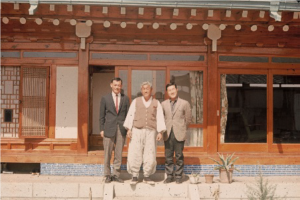 The day came when “Paul” (Yung Shin’s American name) and I arrived by train at the town where his father served as pastor. I immediately observed that the street was filled with children but, unlike other towns I had visited, no American was in sight. We were soon welcomed to the beautiful home of one of the church elders whose livelihood was the apple orchard business. Once we were settled in our room, we were greeted by a couple of other men of the church. I soon learned that this congregation had a different history in recent years than the church in Seoul.
The day came when “Paul” (Yung Shin’s American name) and I arrived by train at the town where his father served as pastor. I immediately observed that the street was filled with children but, unlike other towns I had visited, no American was in sight. We were soon welcomed to the beautiful home of one of the church elders whose livelihood was the apple orchard business. Once we were settled in our room, we were greeted by a couple of other men of the church. I soon learned that this congregation had a different history in recent years than the church in Seoul.
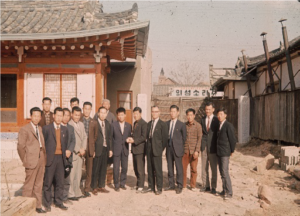 This church shepherded by Yung Shin’s father, like a lot of other Korean Presbyterian congregations, had turned away from the particular denomination related to the World Council of Churches due to the WCC’s leftist political leanings. The irony was that they were no longer aligned with the extremist views of Carl MacIntire who had voiced his strong opposition to the WCC throughout the Republic of Korea. The sad effect was a sense of isolation from American mainline Presbyterian Christians, not to mention so many other Korean Presbyterian churches. These local church leaders soon inquired concerning the doctrinal soundness of my own Christian beliefs. After being reassured, they asked whether there were other Presbyterians in the United States who believed as I did. Appealing to them on the basis of the truth of Romans 11:2-4, I assured them that God had a faithful remnant. They quickly got the point and nodded their reassurance.
This church shepherded by Yung Shin’s father, like a lot of other Korean Presbyterian congregations, had turned away from the particular denomination related to the World Council of Churches due to the WCC’s leftist political leanings. The irony was that they were no longer aligned with the extremist views of Carl MacIntire who had voiced his strong opposition to the WCC throughout the Republic of Korea. The sad effect was a sense of isolation from American mainline Presbyterian Christians, not to mention so many other Korean Presbyterian churches. These local church leaders soon inquired concerning the doctrinal soundness of my own Christian beliefs. After being reassured, they asked whether there were other Presbyterians in the United States who believed as I did. Appealing to them on the basis of the truth of Romans 11:2-4, I assured them that God had a faithful remnant. They quickly got the point and nodded their reassurance.
I commented on the many children we had seen in the streets and suggested (somewhat in humor) that they let this “long-nosed American” attract attention in the downtown streets on Sunday afternoon and Yung Shin could preach to the gathered crowd. Sunday morning arrived and I was delighted to be able to preach the sermon I had prepared for the worship hour. After lunch at our host’s home, we were soon accompanied by the elders and deacons from the church. They were taking me at my word and would accompany Yung Shin and myself for ministry in the downtown streets. I would preach and Yung Shin would interpret my English words into the Korean language.
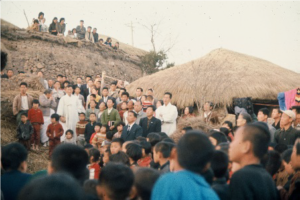 After we preached in the streets twice with no visible results, the elders and deacons suggested that we visit a village just outside of town where they were establishing a daughter church. We all walked to this village of mud-brick walls and thatched-roof homes where we entered a small church building that was soon packed with children and youth and a number of adults. Yung Shin had barely introduced me and I had begun to speak when quite suddenly Yung Shin and I were the only ones left in the building. What had I said to cause such offense to the congregants? Yung Shin and I were dumb-founded. All of a sudden we learned that there was a fire in the village. As we left the building Yung Shin blurted out, “Maybe God has prepared this fire!”
After we preached in the streets twice with no visible results, the elders and deacons suggested that we visit a village just outside of town where they were establishing a daughter church. We all walked to this village of mud-brick walls and thatched-roof homes where we entered a small church building that was soon packed with children and youth and a number of adults. Yung Shin had barely introduced me and I had begun to speak when quite suddenly Yung Shin and I were the only ones left in the building. What had I said to cause such offense to the congregants? Yung Shin and I were dumb-founded. All of a sudden we learned that there was a fire in the village. As we left the building Yung Shin blurted out, “Maybe God has prepared this fire!”
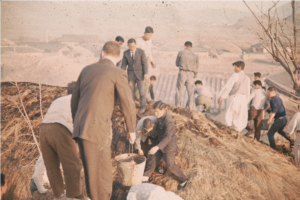
Soon I was standing on top of a wall and was part of a bucket brigade. One of the elders asked me to hand him my camera that was strapped around my neck. He then began taking pictures of this entire event. After fifteen minutes or so the fire on the thatched roofs of a couple of the homes was totally extinguished. Paul and I immediately jumped upon the roofs and, after being reassured that everyone was safe, I began to speak of a far different kind of fire to which the Bible refers. I expounded the gospel in English and Yung Shin interpreted in Korean. I had had some experience with the Open-Air Campaigners in Los Angeles and on Hollywood Boulevard as a seminary student, but I had never preached to a crowd this size in the open air. Many hands were raised in response to our brief message. Wanting to be sure that they understood what I was calling for by way of commitment, I explained further the seriousness of such a commitment, i.e. the cost of discipleship. When I again called for a show of hands, the results exceeded anything I had ever personally experienced. The presence of the Lord was upon this gathering of people. They had been prepared and were awe-struck by the power of the simple message of the gospel of Jesus Christ.
A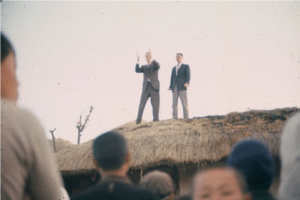 s we were leaving the scene, I noticed a young man on a higher level of homes peering down at me. I asked him if he had committed his life to Jesus Christ. He replied, “I am a Buddhist.” I said, “Buddha is dead, but Jesus Christ is still alive!” “How do you know?” he inquired. “Because he lives within my heart!” I stated. On the way back to the town, as the sun was setting, a jubilant group of elders and deacons were singing in Korean the words of a familiar hymn: “Bringing in the sheaves, bringing in the sheaves.
s we were leaving the scene, I noticed a young man on a higher level of homes peering down at me. I asked him if he had committed his life to Jesus Christ. He replied, “I am a Buddhist.” I said, “Buddha is dead, but Jesus Christ is still alive!” “How do you know?” he inquired. “Because he lives within my heart!” I stated. On the way back to the town, as the sun was setting, a jubilant group of elders and deacons were singing in Korean the words of a familiar hymn: “Bringing in the sheaves, bringing in the sheaves.
We shall come rejoicing–bringing in the sheaves.” That evening the Presbyterian church building in town was packed as many from the village had come to say “Good-by” to Yung-shin and his longnosed American friend. Just before rising to deliver my fifth sermon of the day, it must have been the Holy Spirit who directed my heart and mind to Jesus’ words in Matthew 10:27: “What I tell you in the dark, say in the light, and what you hear whispered, proclaim upon the housetops.”
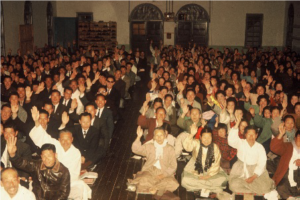 In addition to the Saimoonan Presbyterian Church, Marilyn and I were privileged to visit Yung Nak Presbyterian Church in Seoul–the largest Presbyterian congregation in the world. Every worship service at Yung Nak began with the singing of the Korean version of the English hymn: “Hail to the Brightness of Zion’s Glad Morning”–a testament to God’s mighty work in that land. During the Korean War the Yung Nak Church was uprooted and had to move farther south settling into three major areas. Before returning to Seoul the members of the congregation committed themselves to establish churches in those areas of their temporary dislocation.
In addition to the Saimoonan Presbyterian Church, Marilyn and I were privileged to visit Yung Nak Presbyterian Church in Seoul–the largest Presbyterian congregation in the world. Every worship service at Yung Nak began with the singing of the Korean version of the English hymn: “Hail to the Brightness of Zion’s Glad Morning”–a testament to God’s mighty work in that land. During the Korean War the Yung Nak Church was uprooted and had to move farther south settling into three major areas. Before returning to Seoul the members of the congregation committed themselves to establish churches in those areas of their temporary dislocation.
As the people and land of the Republic of Korea once again face the threat of imminent devastation, I invite Christians in America to join me, as God leads, in a weekly prayerful singing of Thomas Hastings hymn: “Hail to the Brightness of Zion’s Glad Morning” and offering up prayers of intercession for the people and churches of Korea, remembering as well that there are also Christians living in North Korea. Pray for the radio broadcasts out of HLKY in Seoul.
.
About the Author:
David C. Brand has served churches in Washington, Ohio, New Jersey, and Virginia, administered Christian schools in New Jersey and Arizona, served a year in mission work in Seoul, Korea, and directed ADVOCATE Enterprise <www.advocateenterprise.org>, an educational project, in Ohio. He is the author of Profile of the Last Puritan: Jonathan Edwards, Self-Love, and the Dawn of the Beatific published by Scholars Press as part of the Academy Series of the American Academy of Religion, 1991. He and his wife, Marilyn, have four grown children and eight grandchildren.
Comments are closed for this Article !

